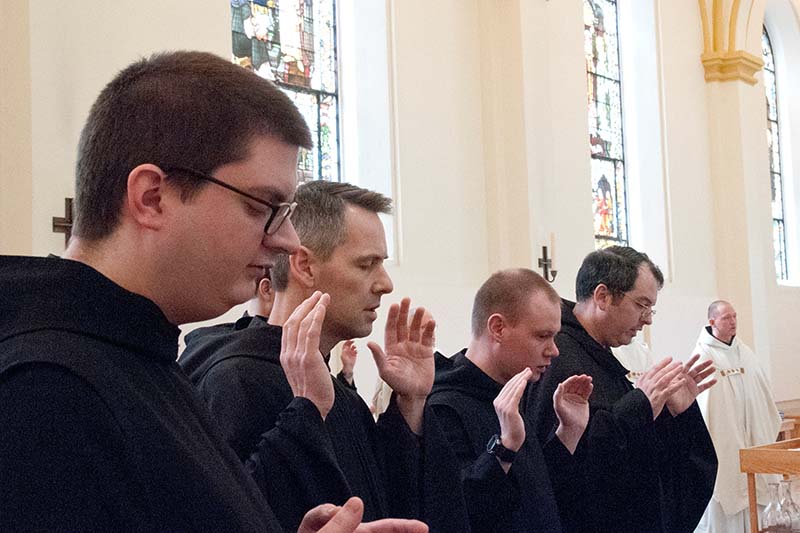Community Rank
Fr. Adrian Burke, OSB
Thursday, November 9, 2023

"The monks keep their rank in the monastery according to the date of their entry, the virtue of their lives and the decision of the abbot."
Rule of St. Benedict 63.1
I begin with a verse from chapter 63 of the Rule, "On Community Rank." Establishing a sense of equality in the community - seeing one another as brothers living together under a rule and the authority of an abbot ("father") - has to be supported by the respect we give to one another. St. Benedict gives to tenure in the community - how long we've been living the monastic life - primacy of place.
St. Benedict wants the brothers to keep in mind that one's age does not automatically determine rank in the community (RB 63.5). The length of time spent in the "workshop of good works" or "school of the Lord's service" will determine rank as compared to others within the monastic community.
For Benedict, the wisdom one may have gleaned about worldly ways in the years before entering the monastery, or even merely human ways of thinking and acting, is not the same as the wisdom of the Lord - for the Lord's ways are not human ways, and God's thoughts are as far beyond ours as the heavens are above the earth! (Isaiah 55:8-9)
While it's true that experience doesn't necessarily lead to wisdom - the fool is one who has been around a long time and never seems to learn from his or her mistakes, or to adjust or adapt to the demands of a situation that he or she has seen before. Nonetheless, Benedict is generous and wants the monks to err on the side of tenure in the community when rank is considered.
However, as he writes in a later chapter, quoting from St. Paul, they should each try to be the first to show respect to the other (Rom 12:10). For St. Benedict, honoring one another, showing mutual respect, is part-and-parcel of the good zeal of a monk (RB 72.4). Respect is given to all others, regardless of age or tenure in the community. Human dignity demands it, and so for Benedict, a person's dignity trumps rank.
One way of framing what the monastic life is all about is to appreciate that the discipline of our rule and our life together in community is intended as a means for learning to be human in the ways Jesus was human - a school in which we "learn Christ," a turn of phrase we find in Ephesians 4:20. The one who has been doing this longer is presumed by Benedict (again, generously) to have advanced further along this learning curve.
But, as Benedict allows, if a monk has in fact demonstrated that he is further along by a more virtuous (i.e. more loving) way of behaving, then the abbot has the authority to put that one ahead of the others, who may indeed have been here longer. For Benedict - love is everything - it is the only real measure of Christ and the only way "holiness" is made visible!